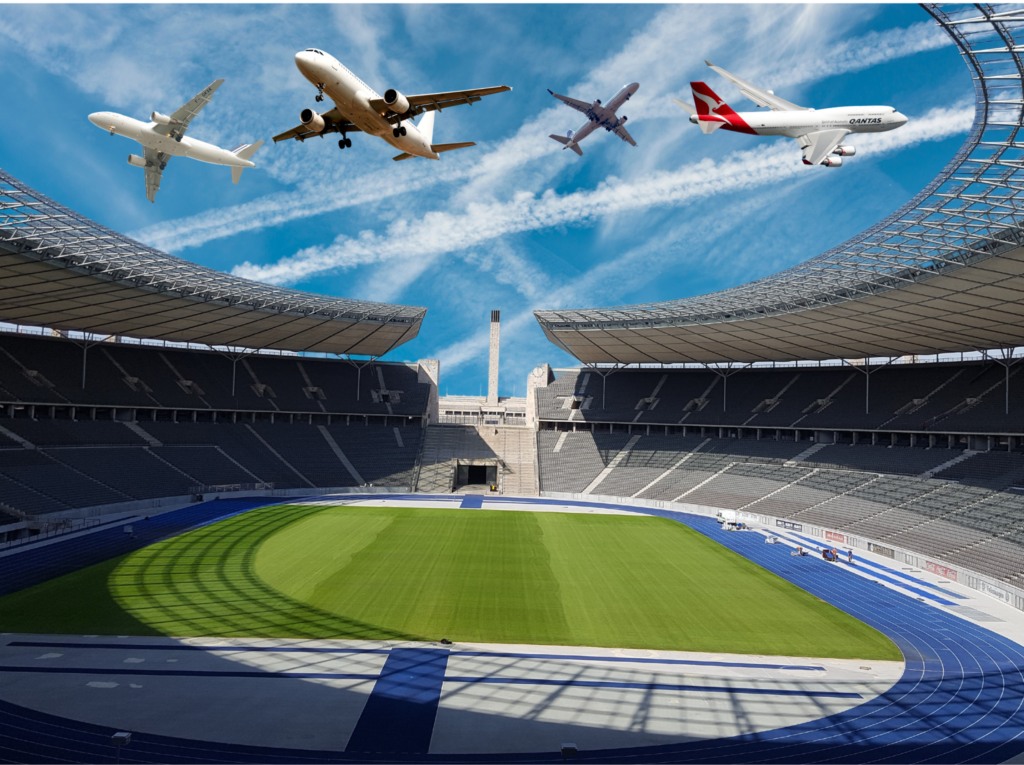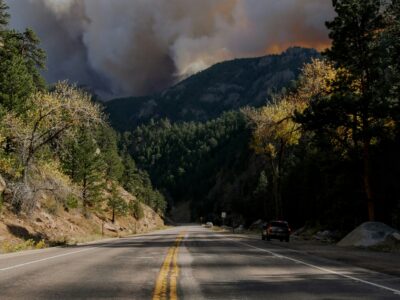The Dirty Truth Behind a Feel-Good Energy Story
The San Francisco 49ers just became the first NFL team to buy sustainable aviation fuel. But that move is overshadowed by Big Oil sponsorships in sports.

Did you see the story about a new ‘NFL first’? The San Francisco 49ers announced that it was the first NFL franchise to buy sustainable aviation fuel or SAF —enough to fly from San Francisco to LA for their Sunday game against the LA Rams. The story generated headlines, the way any “first” tends to. The 49ers called it “a meaningful part of our commitment to more sustainable practices” and praised United for its SAF program, which both companies said can reduce greenhouse gas emissions “by up to 85% on a lifecycle basis.”
Sure, that’s good news. Moving toward more sustainable jet fuel (which is at least double the price) could be a positive step in reducing the carbon footprint of air travel. Given the amount of flying that NFL and other major league sports teams do during a season, transitioning to SAF would be notable.
But I see at least five problems with this feel-good sports story.
For one thing, the San Francisco 49ers are one of 6 sports teams in California that have sponsorship deals with oil, gas, and utility companies, according to the recent survey that I conducted for the UCLA Emmett Institute looking at how Big Oil buys influence with fans and audiences.
The “Foul Ball” survey, found more than 60 high-pollution sponsorship deals in the U.S. that are part of a $5.6 billion global sportswashing industry. The Sacramento Kings, LA Dodgers, the Los Angeles Football Club (LAFC), San Francisco Giants, and Oakland Athletics all have partnerships with oil companies (Chevron, Arco, and Phillips 66 to be specific). The survey also noted that the San Francisco 49ers have a longtime sponsorship with NRG Energy, a founding partner of their stadium. NRG Energy helped build a solar installation for the team’s Levi’s stadium, earning it the naming rights of the NRG Solar Terrace, which you can reserve to throw a party on the green roof. Although NRG Energy as a company does generate some electricity using some renewable sources like solar and wind, more than 80% of its fuel mix is from fossil fuels, according to a 2023 analysis of the top 47 investor-owned utilities. Indeed, NRG Energy operates several oil, coal, and fossil gas facilities from Delaware to California (map here). It also sells gas directly to customers. NRG is active in sports, sponsoring the 49ers and 5 other teams in the NFL and MLB, according to our review of Commercial Guides by SportsPro Media, a deal-tracking firm.
Now, if the 49ers announced that the team’s official energy partner was using 100-percent clean power rather than coal, oil, and methane gas—that would be news! But that’s not the case here.
Secondly, the San Francisco 49ers seem to also have an active partnership with Chevron—a sponsorship that did not show up in our recent survey. For a decade, Chevron partnered with the 49ers Foundation, a nonprofit that offers educational and athletic opportunities to students in the Bay Area. In 2019, the team announced that Chevron was renewing the deal and would continue as the “presenting sponsor of the Chevron STEMZONE at Levi’s Stadium and the 49ers STEM Leadership Institute” (STEM being Science, Technology, Engineering, and Math). The Chevron red and blue logo is included in the foundation’s website (though you might have to squint to find it). A video from 2019 shows a Chevron executive speaking to the children about career opportunities in science and engineering. The foundation’s website and social media accounts also promote “Teacher of the Game presented by Chevron,” where educators in the Bay Area get recognized for their contributions. It’s a relatively subtle way to get the crowd on its feet for hard-working teachers. And an oil company.
It’s not that surprising that Chevron would have an active partnership with the 49ers. My survey found that the oil company has 9 sponsorship deals with teams: the Oakland Athletics, San Francisco Giants, the Sacramento Kings, New Orleans Pelicans, Denver Broncos, New Orleans Saints, LAFC, Austin FC, and the Seattle Sounders (through its ExtraMile convenience store and gas station brand). Chevron frequently sponsors STEM initiatives that showcase the oil company as a forward-looking community partner investing in the education of Bay Area children on behalf of the Giants and the Athletics.
Meanwhile, Chevron and its attorneys are leading the charge against climate lawsuits in state courts and at the Supreme Court. California’s lawsuit accuses Chevron and the other defendants of public nuisance, negligence, and fraud for allegedly deceiving the public about climate change for decades. If the 49ers really wanted to demonstrate their commitment to sustainability, they could end any partnerships with Chevron, which the state Attorney General accuses of creating, and covering up, a “truly staggering” public nuisance for Californians to clean up for decades to come.
The third reason to scrutinize this ‘feel good’ story about the 49ers flying down on sustainable aviation fuel to get beat by the Rams has to do with LA not San Francisco. It just so happens that Shell Oil is an official sponsor of both SoFi Stadium and the LA Rams. This multi-year deal signed in 2023 was also not captured in the deal-tracker I used for the Foul Ball survey. Instead, LA Times Climate Columnist Sammy Roth, who wrote about the Foul Ball survey here, pointed to the Shell deal on X. As part of the deal, Shell does gas giveaways every gameday, as long as you are a “Fuel Rewards member” and buy “Shell V-Power® Nitro+ Premium gasoline.” So, how much more carbon-emitting gasoline was used, and given away, for this 49ers-Rams game than was conserved by the 49ers’ flight?
Reason # 4 is that all jet travel is environmentally damaging. Don’t take it from me, take it from Jessie Fleming, the incredible UCLA soccer player who minored in environmental science and went on to play in England and now the U.S. for the Portland Thorns. Fleming recently told the New York Times that she’s working to offset the carbon footprint of her 2024 season travel. She said it’s been upsetting to go from traveling by train to soccer matches in England, to flying thousands of miles every weekend in the U.S. “As players, we have a responsibility to draw attention to those problems and suggest ways leagues and governing bodies can adjust the format of tournaments or the schedule of leagues to help reduce those footprints,” she said in the interview. She’s right. A far more sustainable option for travel between San Francisco and Los Angeles would be a high-speed train. If and when California has a functioning bullet train, will the teams use them?
Lastly, it’s not clear from the 49ers press release whether the purchase of SAF even covers the flight back from Los Angeles to San Francisco. Maybe I’m being overly suspicious, but the phrase “to cover its game-related flying on United from San Francisco to Los Angeles this Sunday” sounds awfully specific. And going green for a one-way flight feels thin for the kind of rah-rah press coverage the story got. Let’s wait and see if the team repeats this play, shall we?
You can read more about oil, gas, and utility sponsorships in sports here.
Reader Comments
2 Replies to “The Dirty Truth Behind a Feel-Good Energy Story”
Comments are closed.






“…Why There Will Never Be A Zero Emissions Electricity System Powered Mainly By Wind And Sun…”
The reason should be obvious to everyone although, for some reason I cannot understand, it is not. The reason is that the intermittency of wind and solar generators means that they require full back-up from some other source. But the back-up source will by hypothesis be woefully underused and idle most of the time so long as most of the electricity comes from wind and sun.
No back-up source can possibly be economical under these conditions, and therefore nobody will develop and deploy such a source.
https://wattsupwiththat.com/2024/09/22/why-there-will-never-be-a-zero-emissions-electricity-system-powered-mainly-by-wind-and-sun/
Thanks for looking into this PR move by the 49’ers and NFL. I admit I watch football on TV occasionally, but I think the NFL is the poster child of what’s wrong with business in the USA. Unless someone like you uncovers the reality of what large corporations want the public to believe they are doing, no one else is going to be looking behind the “Wizard of OZ’s” curtain”.